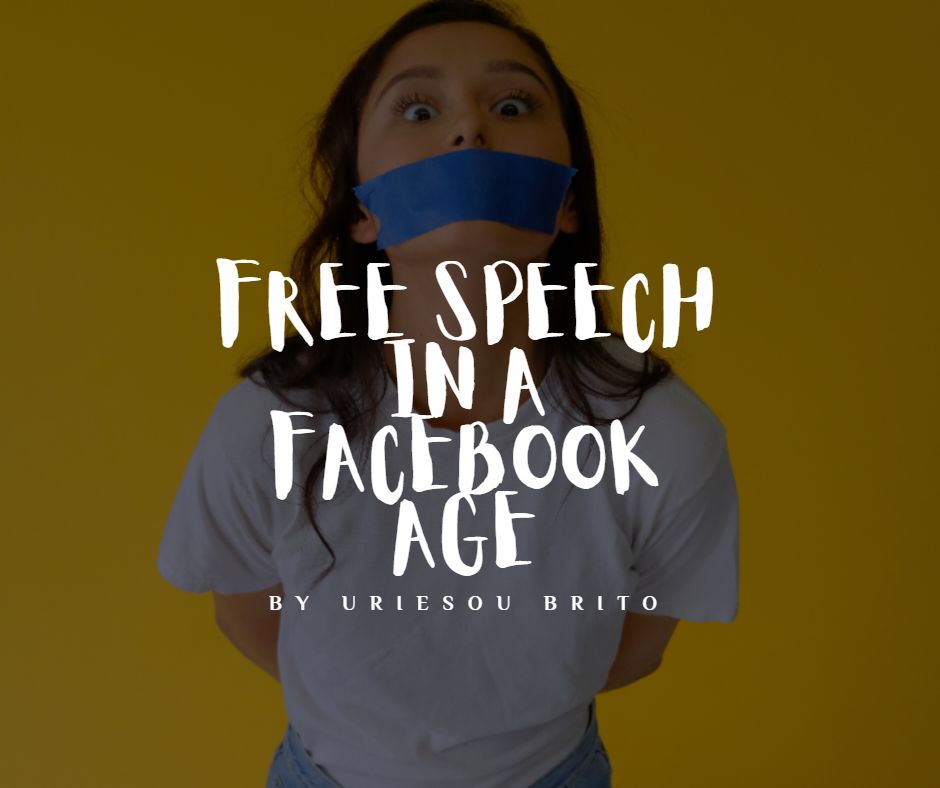The conversation on free speech is a rather intriguing one at this stage of American history. The First Amendment reads in part: “Congress shall make no law…abridging the freedom of speech. ” Madison, who drafted the Bill of Rights, made the case that the definite article “the” before “freedom of speech” intended to convey that our freedoms to manifest our opinions and ideas p͟r͟e͟c͟e͟d͟e͟ the government. In other words, “the freedom of speech” is an inherent feature of our humanity, not a gift from the government.
In our day, free speech is under the threat of massive social media conglomerates. These–Twitter and Facebook–offer a narrow understanding of free speech. While they share the protections of private businesses, they function as a mouthpiece for the “proliferation of mainstream perception.” They are no longer under the kinds of restrictions one can impose on private businesses. At this stage, their algorithms and censorship strategies are driven by a particular narrative that is shaping the modern discourse on any given issue. Variety Magazine noted that Facebook wants the advantages of defining itself as a tech company, “and not taking the liabilities inherent in being a media company.” I continue to argue that Christians should stay on these platforms until they are kicked out. In the meanwhile, go ahead and download all your data (pictures and posts) in to one file, should the purge begin. Nevertheless, as I have argued elsewhere, Facebook still provides the most outrageously large platform to convey ideas. Missionaries in far lands raise support, friends raise funds for godly causes, pastors get their voices and opinions to large audiences, interest in theology and biblical studies have increased through private groups, churches promote physical activities and virtual events, and more. Facebook has been a fruitful platform for many Christians. While there is a down-side, the final tabulation ends on the positive overwhelmingly.
Still, the question of free speech carries heavy importance when Christians think about what can be said in our day. The Bible speaks of the Christian virtue as salt-speakers–those who season the conversation with blessings and not curses. For the Christian, under the authority of the Spirit, speech is not free, it has to be limited. The Church safeguards her ability to speak redemptively into the life of the community. Christians live under the benediction of the 9th commandment. We cannot bear false witness, and that is for the good of language and civilization. While society depends on free speech for ideas to prosper, it does not conflict with the Church’s ability to condemn speech that does not conform to the language of Christ.
What tech giants like Facebook and Twitter are doing is treating their platform in god-like fashion prohibiting speech that bears false witness to their structure of language. To bear false witness to these arbiters of truth is to speak in a way that betrays their general elitist consensus that almost always favors the leftist agenda.
For a society to remain free, she has to accept freedom of speech, so long as Thomas Jefferson argued, it does not “pick my pocket or break my leg.” The question of whether Trump’s speech incited violence is unclear in my mind. I agree with several voices both Opinion pieces and in politics (ND Sen. Kevin Cramer, as an example) who noted that while Trump used unwise language, much of which has been repeated in past speeches, it fell far short of criminal. As Ben Shapiro noted recently: “When we broaden the definition of ‘incitement,’ freedom suffers.
Nevertheless, our responsibility at this stage is to keep doing good by supporting institutions where the good and free speech is promoted; where ideas can be discussed freely without fear of censorship. Someone asked me recently what makes the Left monolithic? The answer is that while there are leftist voices like Bill Maher out there advocating free speech, by and large, the Left is eager to target speech. What kind of speech is acceptable–the kind that bans the contrarian’s story. In our day, all it takes to trigger such groups is to believe that we would dare communicate our beliefs.
















